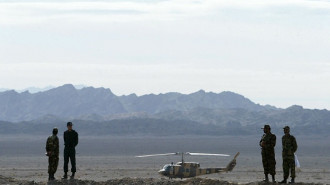NATO ends partnership deadlock over Turkey-Austria dispute
NATO agreed a deal Tuesday to unblock partnerships with around 40 non-member countries which had been crippled by a dispute between Turkey and Austria, officials said.
Turkey, the second-biggest military force in NATO, had vetoed all cooperation with Austria after Vienna called for the European Union to halt membership talks with Ankara.
This had the effect of blocking the entire partnership programme with dozens of other non-NATO countries across the world.
The deadlock was ended on Monday when NATO's 28 member states agreed to amend the system so that cooperation "will be planned on an individual basis, rather than collectively", said an unnamed NATO official.
"This will substantially reduce the risk of blockages to cooperation with partners across the board," he added.
Turkey, meanwhile, is expected to uphold its veto on Austrian participation, officials said.
Relations between Vienna and Ankara soured when Austria called for the EU to suspend Turkey's accession bid because over human rights issues.
Austrian Defence Minister Hans Peter Doskozil reportedly said that Turkey's block was putting "Europe's security interests in danger".
The NATO official said the military alliance would continue its cooperation with Austria, a "long-standing NATO partner and we greatly appreciate its valuable contributions to our shared security".
"We hope the bilateral issues between Austria and Turkey will be solved as quickly as possible," the official said.
The NATO partner scheme is aimed at building up inter-operability, capacity and goodwill.
Under the scheme, partner countries do not sign up to the NATO collective defence commitment, but the agreements are seen as an important political signal, for example in countries such as Georgia and Ukraine locked in bitter disputes with their Soviet-era master Russia.
Austria has been a neutral country since a Cold War accord between Washington and Moscow agreed its status.
Turkey resumed European Union accession talks in 2005, however have made little headway amid growing questions in Brussels over the country's human rights record.

![Palestinians mourned the victims of an Israeli strike on Deir al-Balah [Getty]](/sites/default/files/styles/image_684x385/public/2024-11/GettyImages-2182362043.jpg?h=199d8c1f&itok=xSHZFbmc)


![The law could be enforced against teachers without prior notice [Getty]](/sites/default/files/styles/image_684x385/public/2178740715.jpeg?h=a5f2f23a&itok=hnqrCS4x)
 Follow the Middle East's top stories in English at The New Arab on Google News
Follow the Middle East's top stories in English at The New Arab on Google News
![Fakhrizadeh [AFP] Fakhrizadeh [AFP]](/sites/default/files/styles/image_330x185/public/media/images/774C39F7-8F7A-4D67-B998-27D102FCB4A7.png?h=d1cb525d&itok=j9eGvunV)

